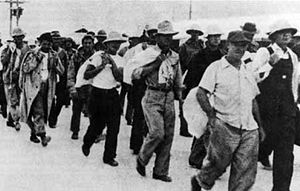ISIS Beheadings Today, but 100 Americans Executed on Wake Island in 1943
 (Americans on Wake Island marched into captivity in 1941, later executed)
(Americans on Wake Island marched into captivity in 1941, later executed)
Beheadings are a savage throwback to an aspect of war that has become more “civilized” today. The intent to cause “shock and awe” through isolated acts of excessive violence remains a staple of war. During World War II, General LeMay’s fire bombings of Tokyo civilians were intended to pressure the Japanese into surrender, but only the later atomic bombs took away the will to continue fighting.
In our media-obsessed world, ISIS doesn’t have to slay great numbers to achieve maximum emotional impact as the West watches news from their peacetime living rooms. Were the beheadings an indirect result of foreign policy in Iraq that had been miscalculated while hoping for the best? Does it bear a resemblance to our lack of national defense before Pearl Harbor?
The real cost of trendy isolationist politics never gets discussed by the liberal media, but on October 7, 1943, one-hundred Americans were executed by the Japanese on Wake Island. They were blindfolded and shot before a firing squad, in cold blood.
We all remember how pacifist America was surprised by the December 7, 1941, attack on Pearl Harbor–and by surrender of the Philippines, Bataan, and Corregidor. Britain similarly surrendered Singapore without a fight to a much lesser Japanese force.
Fewer remember the heroic fight that American troops made in defending Wake Island back then, not giving up until they were told to do so. Many captives were shipped off as POWs elsewhere, as were those who were told to surrender on Bataan. The remaining civilian contractors who were finally executed on Wake had been performing forced labor.
Should we simply blame the Japanese commander, Rear Admiral Shigematsu Sakaibara who led the Japanese garrison on the island? Yes and no. War slips into hardball mode when your country is fighting for its life. Rules of Engagement and soft philosophies like “winning hearts and minds” can’t be afforded.
Sure, America finally woke up from its isolationist slumber and took to the field, but what should we tell to the relatives of those who perished in that early period when American forces were “written off” as not needing adequate national defense?
 (Americans on Wake Island marched into captivity in 1941, later executed)
(Americans on Wake Island marched into captivity in 1941, later executed)